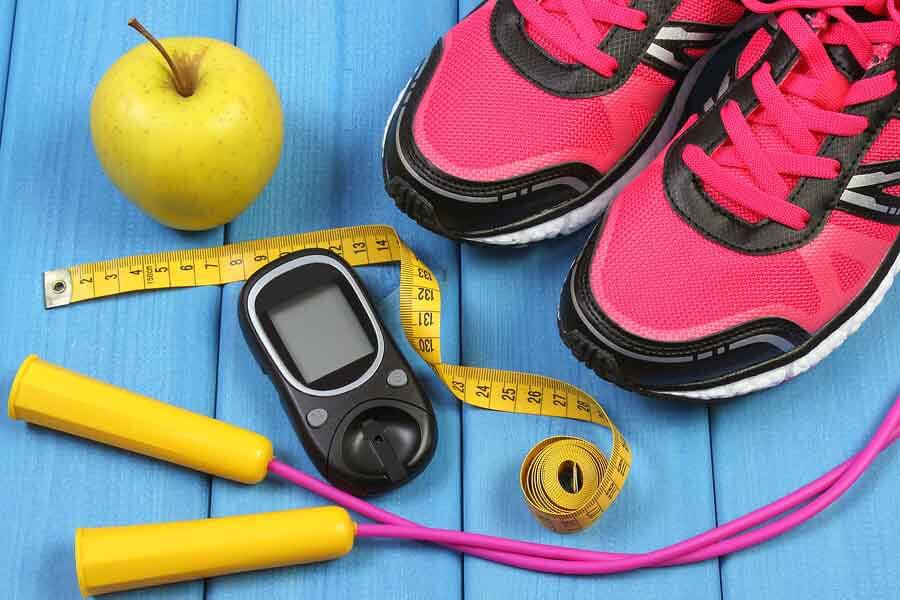According to a 2011 study by the Centers for Disease Control and Prevention, there are 25.8 million people, or over 9% of the U.S. population that are affected by either type 1 or type 2 diabetes. For those with diabetes, it’s necessary to follow a diabetic or prediabetic diet depending upon whether you have type 1 or type 2 diabetes respectively.
This diet takes into account your health and ensures you eat only foods that will help to improve your blood sugar control and insulin sensitivity. Here are some of the most Frequently Asked Questions about a diabetic and prediabetic diet:
 A: A Diabetic Diet is one that helps to control your blood sugar levels by eating primarily low-carb foods.
A good diabetes diet plan involves plenty of:
A: A Diabetic Diet is one that helps to control your blood sugar levels by eating primarily low-carb foods.
A good diabetes diet plan involves plenty of:
 A: It is definitely possible to slow the progression, and sometimes to completely reverse prediabetes. This requires initiating lifestyle changes where you adopt new healthy habits. If your blood sugar spikes to a level that is dangerous, but is short of being considered type 2 diabetes, take this as an opportunity. Yes, it makes you much more likely to develop type 2 diabetes, stroke, and heart disease. But dropping your blood sugar numbers back to normal is entirely possible. Below are the best ways to make this happen.
A: It is definitely possible to slow the progression, and sometimes to completely reverse prediabetes. This requires initiating lifestyle changes where you adopt new healthy habits. If your blood sugar spikes to a level that is dangerous, but is short of being considered type 2 diabetes, take this as an opportunity. Yes, it makes you much more likely to develop type 2 diabetes, stroke, and heart disease. But dropping your blood sugar numbers back to normal is entirely possible. Below are the best ways to make this happen.
Q: What is a Diabetic Diet?
 A: A Diabetic Diet is one that helps to control your blood sugar levels by eating primarily low-carb foods.
A good diabetes diet plan involves plenty of:
A: A Diabetic Diet is one that helps to control your blood sugar levels by eating primarily low-carb foods.
A good diabetes diet plan involves plenty of:
- Fiber-rich whole grains
- Veggies
- Lean proteins
- Legumes
- Nuts and Seeds
- Foods that are high in sodium
- High fat foods
- Sugary foods
- Fruit (in excess)
- Anything with added sugar
- Refined and white grains
Q: Is it different from a Prediabetic Diet?
A: A Prediabetic diet focuses mostly on weight loss, while a Diabetic Diet focuses primarily on blood sugar control. The foods promoted as “healthy” are fairly similar with both diets. The primary difference is the Prediabetic Diet is designed to combat body fat as well. That’s not to say a Diabetic Diet can’t be effective for weight loss. The foods you eat are mostly low in calories, sugar, and fat, so you may be able to see effective weight loss over the course of your Diabetic Diet.Q: How many carbs per day on a Diabetic Diet?
A: The amount of carbohydrates you consume on your Diabetic Diet will be determined by your:- Level of physical activity
- Height
- Weight
- Body mass index
Q: Can diabetics take diet pills?
A: Diet pills are NOT recommended by most health professionals, as many of them are untested by the FDA. The majority of diet pills (particularly supplements) are designed to provide “natural” weight loss, but there is very little evidence to back up their claims. Worse, there is little evidence to indicate how they will interact with your health condition. That being said, there are some FDA-approved prescription weight loss drugs that are available for diabetics:- Lorcaserin — This is a serotonin 2C receptor antagonist, which is designed to facilitate weight loss for those already on a healthy diabetes diet plan and workout schedule. Studies have shown that it can help to not only promote weight loss, but also reduce body fat.
- Phentermine — This is a combination of an anti-epileptic and sympathomimetic amine anoretic drug, and it too is designed to be used in tandem with a healthy weight loss diet and workout regimen.
Q: What drinks can diabetics drink?
A: There are a number of beverages you are permitted to drink on your Diabetic Diet:- Coffee (in moderation)
- Tea
- Milk
- Water
- Soda
- Fruit juice
- Sugary fruit drinks
- Pretty much anything with sugar in it
Q: Is a Diabetic Diet good for weight loss?
A: As mentioned above, the primary purpose of the Diabetic Diet is to promote blood sugar control. However, you’ll find that any diet that helps you to eat fewer carbs per day can be a good weight loss diet. With fewer carbs, you’re focused more on eating healthy fats and proteins, both of which promote a faster metabolism and better weight loss–specifically fat-burning. Another good way to promote weight loss: control calorie intake. Stick with a healthy number of calories per day, and you should have no problem losing weight thanks to the Diabetic Diet.Q: Can diabetics have Diet Coke?
A: Diet soda IS permitted on a Diabetes Diet. It contains aspartame, which will not raise your blood sugar levels to the same extent as regular soda. However, why would you want to pollute your body with so many chemicals? All “Diet” products are made with artificial ingredients, most of which are terrible for your health. It’s better to simply eliminate soda completely!Q: What fruit can I eat on a Diabetic Diet?
A: The best fruits are those that contain a lot of fiber, plenty of antioxidants, and less sugar. That includes fruits like:- Grapes
- Papaya
- Mango
- Citrus fruits
- Apricot
- Berries
- Apples
- Pineapples
Q: Can I go on a Diabetic Diet while pregnant?
A: Absolutely! The Diabetic Diet simply helps you to reduce the amount of carbs you consume, but it won’t limit calories or nutrition. You will still provide your body with everything it needs to be healthy while pregnant, minus a few grams of carbs. You may need to increase your healthy fat intake slightly, as that will ensure that your body has all the energy it needs to function properly. But you can enjoy your low-carb diet without worrying about negative consequences for your little one. Note: Always check with your doctor when making dietary changes while pregnant.Q: Can You Stop Prediabetes From Becoming Diabetes?
 A: It is definitely possible to slow the progression, and sometimes to completely reverse prediabetes. This requires initiating lifestyle changes where you adopt new healthy habits. If your blood sugar spikes to a level that is dangerous, but is short of being considered type 2 diabetes, take this as an opportunity. Yes, it makes you much more likely to develop type 2 diabetes, stroke, and heart disease. But dropping your blood sugar numbers back to normal is entirely possible. Below are the best ways to make this happen.
A: It is definitely possible to slow the progression, and sometimes to completely reverse prediabetes. This requires initiating lifestyle changes where you adopt new healthy habits. If your blood sugar spikes to a level that is dangerous, but is short of being considered type 2 diabetes, take this as an opportunity. Yes, it makes you much more likely to develop type 2 diabetes, stroke, and heart disease. But dropping your blood sugar numbers back to normal is entirely possible. Below are the best ways to make this happen.
These are seven daily habits that you can do as a good start:
- Do physical activities such as jogging and exercise for 30 maximum.
- Lower your weight by doing healthy diet lifestyle.
- See your doctor more often every 3 to 6 months, to see if you are improving or not. Your doctor can provide encouragement if you are improving, or give you motivation if you need to get back on plan.
- Eat better by eating vegetables, especially the less-starchy kind of foods such as green beans, carrots, spinach, broccoli, etc. You can also add more high-fiber foods and eat fruits with moderation from 1 – 3 servings per day.
- Yoga, meditation, and enough sleep (7-8 hours/day). A stressed body pumps out hormones that control your heart rate and blood sugar to have enough energy to meet a threat. However, many of today’s stress factors can be reduced significantly through practicing yoga or meditation on a daily basis. If you short change your sleep,you make it harder for your body to use insulin effectively and increase the chances of developing type 2 diabetes.
- Getting support from your love one(s) is one of the important things to keep you accountable when your will power is low. There are groups you can join where people with similar weight loss and exercise goals can help to motivate and keep you on the right path.
- Having a right mind set where you make small steps towards your goal, and accept that there will be days where you don’t achieve your goals. However, commit to rebound from a backslide and get back on track.
Q: Can You Reverse Diabetes?
A: Yes, there are cases where people have reversed type 2 diabetes by losing a lot of weight shortly after a diagnosis. Some studies have shown that through following the steps above for how to stop prediabetes from progressing into type 2 diabetes have also been successful in reversal of type 2 diabetes. The most important changes for type 2 diabetes are to perform weight-loss by doing daily regular exercise, changing your food lifestyle, cutting out alcohols, fatty foods and restricting carbohydrates.Q: Can Whey Protein Help with Diabetes?
A: Yes! Whey protein has been shown in a study conducted by the American Society for Clinical Nutrition to be effective as a glucose-lowering strategy as it can absorb carbohydrates and stimulate insulin release in Type 2 diabetes. There are good reasons to add whey protein powder to your diet to help control your blood sugar level.Latest posts by pete (see all)
- The Best Protein Shakes for Diabetics - November 30, 2022
- Whey Protein vs Pea Protein: Which is Better? - September 27, 2022
- Gluten Free Protein Powder - August 19, 2019





